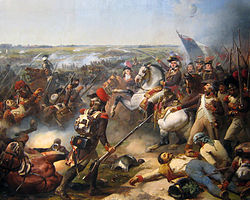Prince Josias of Saxe-Coburg-Saalfeld
Prince Frederick Josias of Saxe-Coburg-Saalfeld (26 December 1737 – 26 February 1815) , was a famous general of the Habsburg Emperors.
| Prince Josias | |
|---|---|
| Prince of Saxe-Coburg-Saalfeld | |
| File:Frederick Josias de Saxe-Coburg-Saalfeld.jpg Portrait of the Prince, wearing Austrian military uniform with the ribbon and star of the Order of Maria Theresa of Austria. | |
| Born | 26 December 1737 Ehrenburg Palace, Coburg, Bavaria |
| Died | 26 February 1815 (aged 77) Coburg |
| Spouse | Therese Stroffeck |
| Issue | Frederick, Freiherr von Rohmann |
| House | Wettin |
| Father | Francis Josias, Duke of Saxe-Coburg-Saalfeld |
| Mother | Princess Anna Sophie of Schwarzburg-Rudolstadt |
| Religion | Lutheranism |
Born at Schloß Ehrenburg in Coburg, he was the youngest son of Duke Francis Josias, Duke of Saxe-Coburg-Saalfeld and Anna Sophie, Princess of Schwarzburg-Rudolstadt.
Josias joined the Habsburg military as Colonel in 1759. After participating in the Seven Years' War, he rose to the rank of Lieutenant Field Marshal by 1773. In the Russo-Turkish-Austrian war of 1788, he commanded an army corps under Freiherr von Laudon, occupying Moldavia, capturing Khotyn in Bessarabia and sharing in Aleksandr Suvorov's success in the Battle of Focşani (August 1, 1789). Having completely beaten the main Ottoman army under Grand Vizier Koca Yusuf Pasha in the Battle of Rymnik, he captured the greater part of Wallachia, including Bucharest, being welcomed by the population after the flight of Prince Nicholas Mavrogenes. Soon after that, he became a Field General.
During the occupation of Moldavia, Josias met Therese Stroffeck. On September 24, 1789, in the town of Roman, she gave birth to a son. The son's name was Frederick. Josias married Therese after their return to Coburg, on December 24. He then said that he was the father of Frederick. Frederick was ennobled by the Austrian Emperor on August 25, 1808. On February 17, 1853 the Duke Ernst II of Saxe-Coburg-Gotha created him Freiherr von Rohmann, named after the place of his birth. But Frederick, because he was born before his parents were married, did not inherit the duchy of Saxe-Coburg-Saalfeld.
In 1793 and 1794, Josias commanded the army in the Austrian Netherlands during the Flanders Campaign. Because of his victories in the French Revolutionary Wars (in the Battle of Neerwinden (1793) and the Battle of Aldenhoven (1794)), he returned the region to Austrian control. Entering France, he took Condé, Valenciennes, Quesnoy and Landrecies. However, due to poor positioning he suffered a string of minor setbacks. This poor positioning was caused by disunity amongst the Allied powers and their forces. His army than suffered a decisive defeat at the Battle of Fleurus (26 June).
After these losses, Josias left the Netherlands. Habsburg diplomats had already decided to give up the region, anyway. Upset by both this and the policies of the Baron Thugut, Josias resigned as Field Marshal. The Count of Clerfayt took over the position. Josias then went to Coburg, where he later died.
Prince Josias Of Saxe-Coburg-Saalfeld Media
The Battle of Fleurus on 26 June 1794, where the Prince of Coburg was defeated by General Jourdan. Painting by Jean-Baptiste Mauzaisse, 1837.

